Loretta: What is wrong with you?
Amber: I don't know. I just didn't want to win like this.
Loretta: You stop right there. You are a good person. Good things happen to good people.
Amber: Really?
Loretta: No, it's pure bullshit, sweetie. You're lucky as hell, so you might as well enjoy it.
It's comforting to believe in a universe where good deeds are rewarded and bad behavior is punished, but karma is nothing more than an attractive fantasy. We do our best for the sake of doing our best, and sometimes our hard work pays off. But just as often, it doesn't. Idiots stumble into greatness. And good people — deserving people — never amount to anything.
In a perfect world, Amber Atkins (Kirsten Dunst) would be crowned Mount Rose American Teen Princess on the merits of her tap-dancing skills. Becky Leeman (Denise Richards), on the other hand, would be laughed out of the competition for her tone-deaf performance of "Can't Take My Eyes Off You."
In that same idealized world, Drop Dead Gorgeous, the movie that tells their story, would be considered an unmitigated cinematic triumph. But reality is a little more complicated than that.
Michael Patrick Jann's 1999 mockumentary follows Amber, Becky, and their fellow Mount Rose American Teen Princess contestants, a group of mismatched Minnesota high school girls vying for small-town glory. Urging Amber on is her foul-mouthed, beer-guzzling mother, Annette (Ellen Barkin), herself a former contestant, and Annette's best friend, the equally trashy Loretta (Allison Janney). On Becky's side: her dangerously enthusiastic mother Gladys (Kirstie Alley), who also happens to be head of the pageant committee. Tensions run high — and then the death toll starts mounting.
Upon its release, Drop Dead Gorgeous didn't amount to much. Despite a sharp, darkly comedic script by Lona Williams and memorable performances from Barkin, Alley, and Janney, among others, the movie failed to find an audience, earning a disappointing total gross of $10.5 million.
Some little-seen films at least earn critical acclaim, but Drop Dead Gorgeous wasn't so lucky. For the most part, critics were merciless: The film currently has a 28% rating on Metacritic, Entertainment Weekly's Lisa Schwarzbaum gave it a "D," and Janet Maslin of the New York Times wrote that Drop Dead Gorgeous "[makes] its audience wince through what may be a record number of miserably unfunny jokes."
But if Drop Dead Gorgeous were truly the disaster that contemporary critics made it out to be, it's unlikely anyone would still be talking about it 15 years later. (It was never a big enough production to join the ranks of infamous flops, such as Ishtar and Waterworld.) Instead, audiences over the past decade and a half have come to appreciate the unfairly maligned Drop Dead Gorgeous as a searingly funny satire. That is, if they can find it.
"In this age of total accessibility of everything, you can't Netflix this movie, and you can't download it off of iTunes," Jann, the film's director, told BuzzFeed. At the time of publication, a copy of the bare-bones DVD, now out of print, could be purchased on Amazon.com for $60. "This is the ultimate cult movie. You can't see it. I will loan someone my VHS copy for anyone that's interested."
The fact that the once-hated Drop Dead Gorgeous can now be called a cult classic complicates the narrative of failure. Now that it's shifted from box office bomb to misunderstood treasure, can the film be considered a belated success? However unconventional, a circuitous path toward victory isn't entirely unheard of. As anyone who has seen Drop Dead Gorgeous can tell you, losing the beauty queen crown isn't the end of the world.
Amber Atkins may have been a runner-up, but she got what she wanted in the end. And all it took was a freak explosion, a serious case of food poisoning, and a stray bullet to get her to the top. Success may not be based on merit, but it's arbitrary enough to sometimes work itself out eventually.
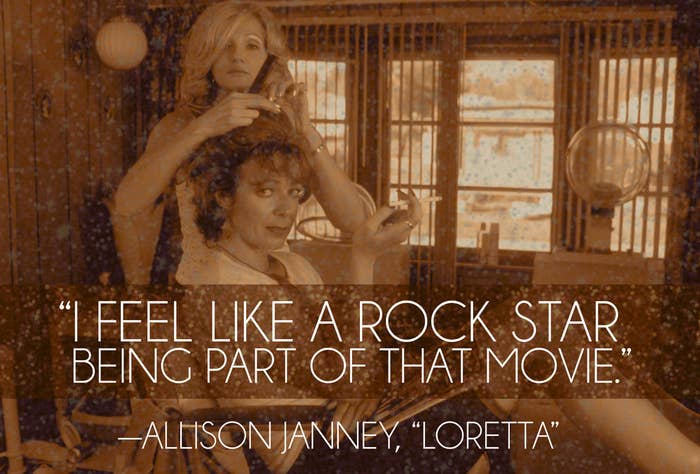
The story of Drop Dead Gorgeous didn't end with its box office failure in 1999 — at least not for those who continued to find the film in the years that followed. While Williams and Jann were putting the film behind them, teenagers who had missed its short theatrical run were discovering it at video rental stores and on cable.
At the dawn of the new millennium, the cult of Drop Dead Gorgeous was just beginning to rise.
"I think a lot of cult movies actually build their cults in people's homes, usually young people who kind of discover these things on cable or on DVD, and then obsessively watch them over and over again," said Joshua Grannell, a writer-director best known for his drag persona, Peaches Christ.
As Peaches, Grannell hosts San Francisco's "Midnight Mass," a recurring series in which he celebrates cult classics from the past several decades with screenings and accompanying drag shows. His email inbox is filled with suggestions for future films, and Drop Dead Gorgeous — which Grannell hasn't put on yet — is frequently on the list.
The rise of Drop Dead Gorgeous' cult fame is that it follows a more recent model, which is largely about self-discovery and sharing among friends.
"In the old days, a cult movie found its audience on the midnight movie circuit, like Pink Flamingos or Eraserhead," Grannell explained. "In the last 20, 30 years, with home video and cable television, a lot of these cults are built in people's living rooms… I think Drop Dead Gorgeous is the perfect example of that."
As the film slowly grew its fanbase, cast members began to receive more recognition for their roles. It came as a surprise to those who knew the film had underperformed, but they were thrilled by the attention, however belated, for a movie they loved making.
"Usually fans are pretty fanatical about that movie," Janney told BuzzFeed. She said she is approached about Drop Dead Gorgeous more often than almost any other project she's been a part of — even after winning four Emmys for her work on The West Wing. "My funniest moment about Drop Dead Gorgeous was being in an airport and sitting next to some kids who were going over their favorite Loretta lines … and I said, 'Um, hi, I played Loretta in the movie.' And they literally started screaming. It was really funny. I feel like a rock star being part of that movie."
Shannon Nelson, who played severely awkward pageant contestant Tess Weinhaus, is still approached by fans, even though she's gone from brunette to blonde and is far more put together than her character ever was. And Will Sasso, who gave it his all as Hank, the mentally challenged brother of pageant judge Harold (Michael McShane), admits to being flattered when people approach him about Drop Dead Gorgeous — even when they tell him they thought he was actually cognitively impaired after seeing his performance.
For Matt Malloy, being recognized is always a bit of a mixed blessing. He played pageant judge John Dough, whose interest in the girls he's judging crosses the line into inappropriate fixation when he follows them around with a video camera.
"Six times in my life I have been in a public setting — once in a mall, once in a bakery, each time with a lot of people around — and a teenage girl has turned and yelled, 'You're the pervert!'" he said. "And I put my hands up and say, 'In a movie. In a movie. Finish the sentence.' But there's this moment where the whole fucking place turns, and it's just like, Oh, you're hanging by your balls, kid. That still happens."
But as embarrassing as that kind of public shaming is, Malloy knows it means love for Drop Dead Gorgeous is still going strong.
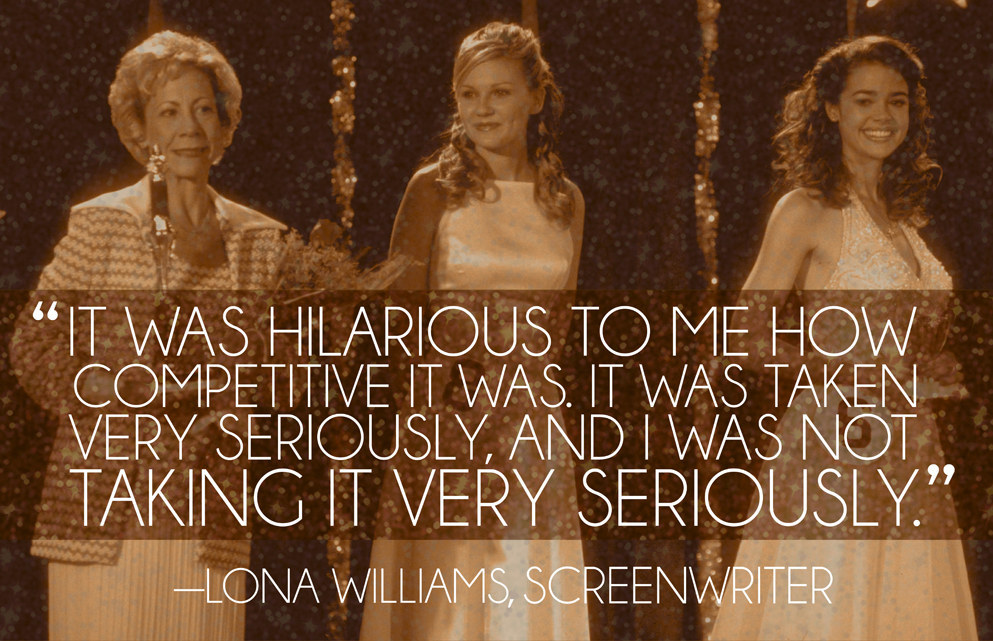
Before Drop Dead Gorgeous was a failure or a success, it was just a script by first-time screenwriter Lona Williams. The film may read as a larger-than-life satire, but for Williams, this was always a more personal story.
Williams was raised in Rosemount, Minn., the clear inspiration for Drop Dead Gorgeous' Mount Rose, Minn. She participated in beauty pageants throughout her youth, culminating in being crowned Minnesota's Junior Miss in high school.
"There was a pageant that everybody did as a junior in high school," Williams told BuzzFeed. "It literally was that everybody does it — except for a few fry girls didn't do it. When you look back on it, it was wacky. There [were] crazy talents that everybody did. But you didn't really think much of it."
Like Amber, Williams went on to nationals, where she came in second place. But winning wasn't everything: To Williams, pageants were an escape. She didn't want to be the next Diane Sawyer, Amber's primary motivation — she just wanted to get out of Rosemount. And she did.
"It wasn't a dream. It was a way out," she said. "I used my scholarship to go to the University of Minnesota, and that was great."
And her experiences in the competition ended up informing her work. "I guess it had a bigger imprint on me than I thought," she admitted. Much of Drop Dead Gorgeous was inspired by Williams' small-town life, but she also incorporated specific details about her pageant background into the script.
"There's 1,000 little pieces … that are from it," she said. Even the absurd stepladder dance that the Mount Rose American Teen Princess contestants perform was grounded in reality. "We used little ladders in our dance [at nationals], which is just a fucking nightmare. That's the worst thing to ever use on stage to haul around and dance with."
Naturally, Williams took plenty of creative liberties in adapting her memories into a script. While Drop Dead Gorgeous is truer to life than many might realize, she embraced a heightened reality where fiery explosions were something of the norm.
It helped that Williams was able to find humor in the proceedings, in sharp contrast to the girls around her who were far more invested in the results of the pageant.
"It was hilarious to me how competitive it was," she said. "It was taken very seriously, and I was not taking it very seriously. That was shocking, so I think that was kind of an exaggeration of what I saw there."
Williams' sense of humor has always skewed dark, which is why Drop Dead Gorgeous is more blistering satire than light humor. (As Matt Malloy put it, "You can say anything around Lona Williams. She'll go double dark on you.") In writing the film, Williams didn't worry about whom she might be offending — she focused on the kind of envelope-pushing that she found funniest.
But the film's relentless darkness and somewhat bleak message may have been part of what made Drop Dead Gorgeous a tough sell. Even Williams was surprised by her own work when she revisited it recently.
"It was really dark. I kind of forgot," she said. "That's what's funny." She paused. "It's not for everyone."
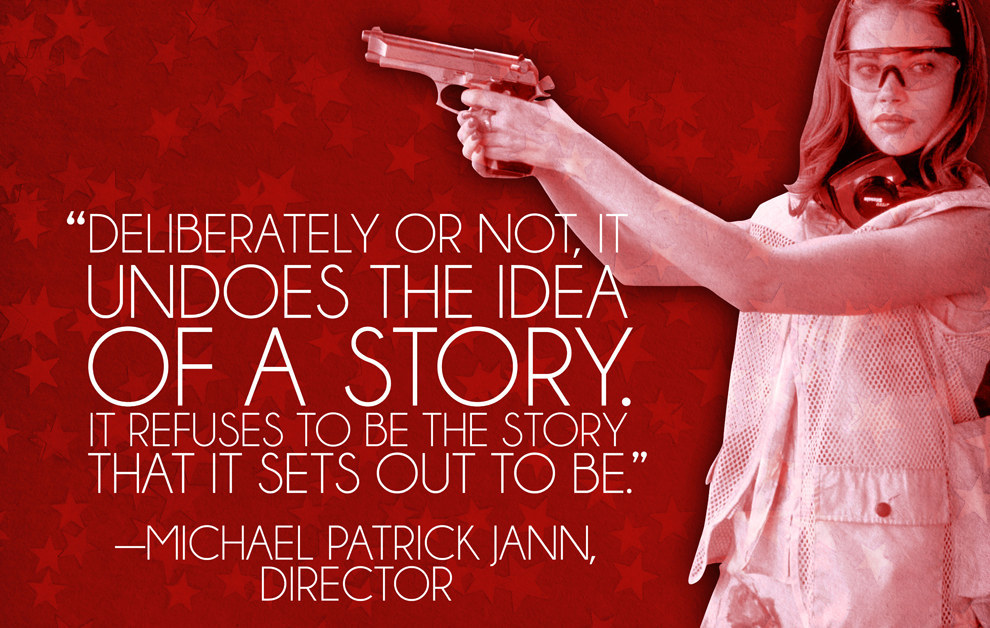
When Jann signed on as the film's director, he was intrigued by how unconventional Drop Dead Gorgeous was. A cast member of MTV's seminal sketch comedy series The State, he had an appreciation for absurdist comedy and less straightforward storytelling.
"I felt like it just wouldn't be like anything else, and that was really attractive to me," Jann said. "Deliberately or not, it undoes the idea of a story. It refuses to be the story that it sets out to be."
Indeed, it's hard to sum up Drop Dead Gorgeous succinctly. The showdown between frontrunners Amber and Becky occurs two-thirds of the way through the film: Becky wins, despite the fact that the audience is rooting for Amber, and then dies suddenly when her victory float explodes. Amber is crowned by default — and trudges along to an anticlimactic finale.
Once at nationals, the contestants from different states discover that the pageant has been canceled. After a brief riot, they return home, defeated.
"You're really invested in this particular story, and then it's gone," Jann said. "And you're like, Oh, this isn't the story of the good girl versus the bad girl. This is a more esoteric story of how success is sort of mercenary and empty and meaningless."
Nevertheless, Jann did his best to shape the script in a way that he felt would make a better movie, sometimes butting heads with Williams in the process. Drop Dead Gorgeous was the first feature film for both writer and director, and they each had clear ideas about what the finished product should look like.
"It was a hard process for [Williams] because she was really new to the whole thing. And there was a lot going on. There was a lot going on that I don't think she was entirely plugged into, and reasons for things to happen," Jann said. "I think I probably could have been nicer. As a 26-year-old, I was probably a little more like, 'No, we're fucking doing it this way. What are you talking about?' I was maybe a tiny bit insensitive at that time in my life."
Williams, who was in her early thirties at the time, didn't mince words when recalling their conflict.
"I just found [Jann] to be a bit of an asshole," she said. "I remember going out in the rain, crying, going to my rental car, like, having a full body cry because I felt like, Oh my god, this could get away and not turn out the way I see it. There were a couple things like that, and then I pulled myself together." Another pause. "I really didn't favor him."
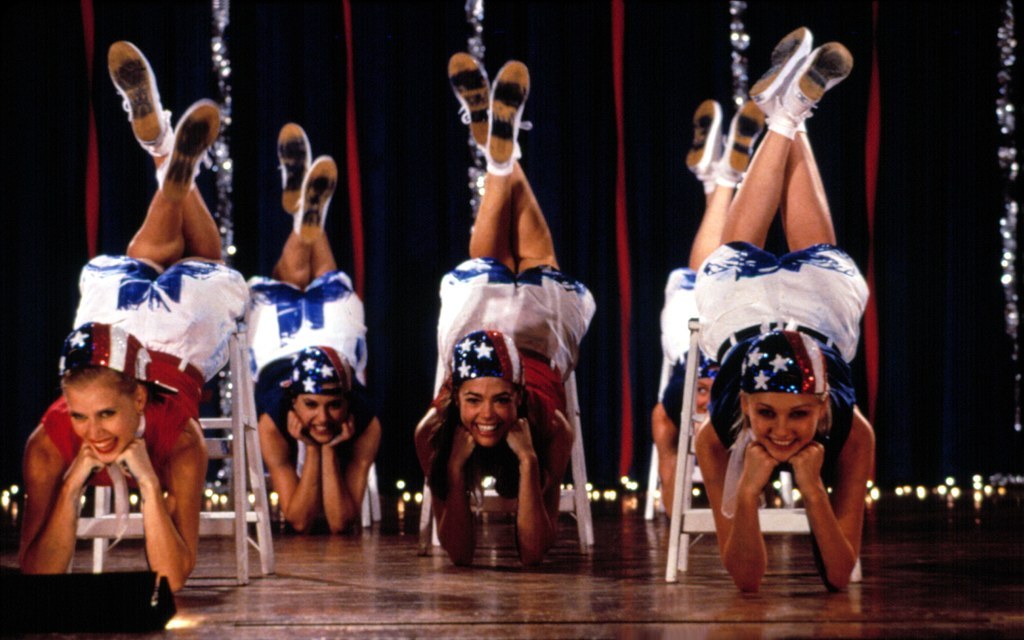
Williams also didn't always see eye-to-eye with producer Gavin Polone, who also cut his teeth on Drop Dead Gorgeous and is now a big name in Hollywood. Since the film, he has produced several notable projects, including Zombieland, Curb Your Enthusiasm, and, most recently, ABC Family's Twisted.
When there were conflicts on set, Polone would side with Jann, Williams remembers, and sometimes she felt like her voice wasn't being heard.
In an early minor disagreement, Williams had envisioned the candy striper character as a cameo for herself, but Polone told her she was too old for the part. "I go, 'Are you fucking kidding me? I wrote that for me. I can do a couple lines.' He's like, 'You're too old… You can have the part that's no dialogue, so you can save us money.'" Williams ended up playing third pageant judge Jean Kangas, who, because she doesn't have any lines in the film, was considered a featured extra.
But when it came to casting as a whole, Williams had some bigger quibbles. Since she had written Drop Dead Gorgeous as a mockumentary, Williams envisioned casting unrecognizable actors to add an air of authenticity to the film.
"I was so stupid," she said. "I kept saying, 'Can't we just go and do non-names so that if you watch this, you actually think it's a documentary?'"
Though the no-names tactic worked wonders for The Blair Witch Project, which hit theaters a week before Drop Dead Gorgeous and raked in a staggering $140.5 million, big names were an important selling point, particularly after New Line signed on to produce the film. Jann said that they went after Sigourney Weaver to play Becky's controlling homicidal mother, Gladys, the role that ended up going to Kirstie Alley. And before Ellen Barkin stepped into the tacky shoes of Amber's mother Annette, producers had wanted Goldie Hawn for the part.
"The Sigourney Weaver version of Gladys would have been a little more composed," Jann said. "Kirstie would have wanted to be Sigourney Weaver. The way Kirstie played her was like Gladys would have liked to be her but couldn't be. She was too bananas to maintain a façade of any sort, which was cool."
As for the Goldie Hawn version of Annette: "I think she would have been less dirty."
Kirsten Dunst and Denise Richards were cast as the younger female leads. Richards was still riding high following her breakthrough role in 1998's Wild Things, in which she also played a spoiled rich girl with a dark side. Dunst was a former child actor, notable for her roles in Interview With the Vampire and Jumanji, among others. But that wasn't what convinced Jann she was right for the part.
"I had just seen her on Celebrity Teen Jeopardy, and she was so sweet and so normal, and so guileless," he said. "That's the girl who can grab the microphone out of the dead reporter's hand and joyfully keep reporting with no guile. There's no evil in her. There's no premeditation… For someone who'd been in movies since she was a kid, like a tiny, tiny kid … she was at ease with being ill at ease, which was charming to me."
Aside from Brittany Murphy, who had made Clueless in 1995, the rest of the girls competing for American Teen Princess were local hires from the Minneapolis area, which helped with the realism for which Williams and Jann were striving.
"One of the big things about trying to cast local, I remember telling the studio at the time, was that we're gonna have trouble finding actresses with normal eyebrows," Jann said. "Because at the time, the thing was these really thin, really sculpted eyebrows. Almost every actress in Hollywood had these very manicured eyebrows. And now everybody kind of does, but at that time, if you went to middle America, those girls were not being face-scaped in the same meticulous manner. So one of the things was just going and finding girls who had authentic Midwestern eyebrows."
Five-time Academy Award-nominee Amy Adams made her film debut in Drop Dead Gorgeous, which she auditioned for while on hiatus at the dinner theater where she'd been performing. Beyond her natural eyebrows, Adams — who declined to comment for this story — was instantly recognized for her talent.
"I remember Amy coming in, and immediately I was like, 'Well, that's it, she's got that part,'" Jann said. "She's fucking great."
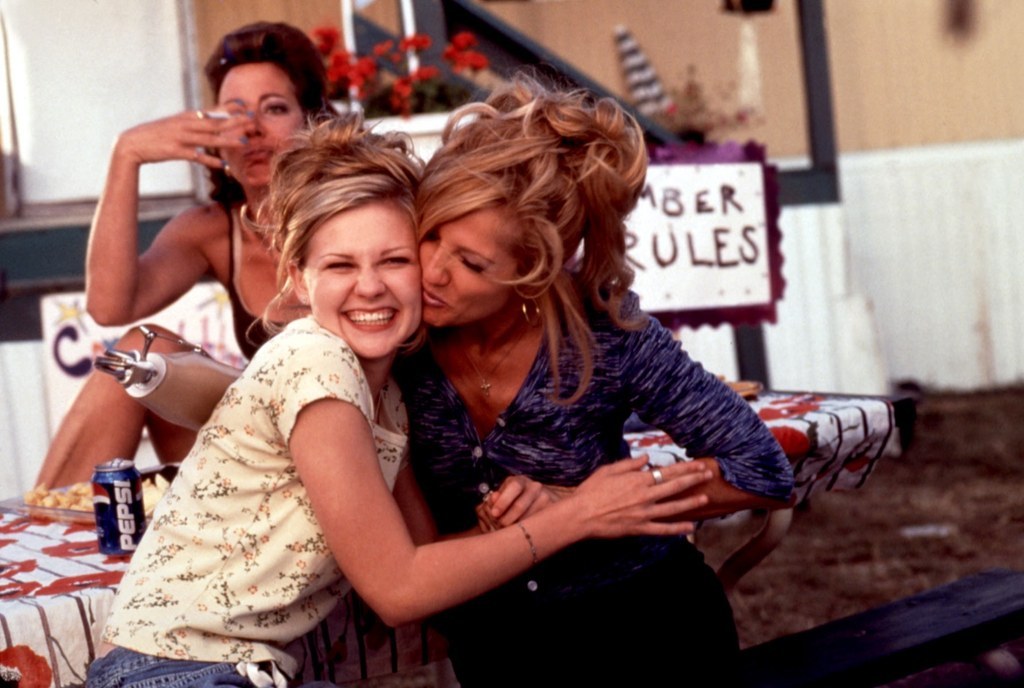
Despite some contention between the screenwriter, the director, and the producer, the making of Drop Dead Gorgeous was largely a great experience for the actors.
Mindy Sterling, who played Gladys' lackey, Iris, had nothing but kind words to say about filming. While most of the cast stuck closely to the script, Sterling was given a bit of leeway in her scenes, a credit to her background as a member of Los Angeles-based improv troupe the Groundlings. Jann, who also came from improv, was willing to let her explore.
"I love to work in that kind of atmosphere [where] a director goes, 'Do it this way, do it that way, now just do whatever you want.' And they just kept recording it," Sterling told BuzzFeed. "And then let them piece it out and edit it. We got to do a lot of that."
For Nelson, who played Tess, the most tragic of all the girls in the running to be Mount Rose American Teen Princess, Drop Dead Gorgeous was an ideal first film. She had to dress down to look the part, and, despite her theater background, she was required to flub all the dance sequences to reflect Tess' obvious lack of talent.
Fresh out of college, she was up to the challenge.
"You're on your first movie set, you're in your first trailer, and then wardrobe comes and brings you your wardrobe for the day," Nelson said. "I had to have a lot of negotiations with my wardrobe, but it wasn't about vanity. It was about Tess. You put on plaid madras shorts and a dog shirt, and you know exactly what your day's gonna be like."
Most of the actors, whether new to movies or more seasoned, spoke highly of the camaraderie on set. As Sasso noted, these kinds of friendships are typical on low-budget films when so many of the actors are almost always on set.
"It just kept getting better. And then you're in Minneapolis for however long. It's just sweet and everyone there is wonderful and actually had those accents," Sasso said. "Everyone fell into this really nice fraternity."
Janney was equally gushy about her time on location, where she embraced Annette's trailer park aesthetic. In fact, she claimed, that ghastly shade of fake tanner was her personal choice.
"It was a great summer, hanging out with Ellen Barkin and being completely silly, and Kirsten, who is such a lovely girl," she said. "We felt like that was something special. I felt like I went to high school with those girls."
Alley and Barkin were perhaps the most removed from the group: Both actors filmed for two weeks and never overlapped. Alley was, by all accounts, a memorable presence on set — for better or for worse. As Jann put it, "It was my introduction to, 'Oh, that person's a huge fucking star.'"
According to Williams, Alley — who declined to comment for this story — refused to wear many of the costumes chosen for her and didn't show up to fittings. Instead, she had her clothes sent to the Scientology Celebrity Centre in Hollywood and would try them on there. She also turned down working with the on-set dialect coach. Malloy recalled Alley's first day on set: "She gets up there and she announces that she's just quit smoking, she's on a diet, and she's got her period. And she's not fucking kidding."
While Malloy was quick to interject that Alley ended up doing a great job with the role, Williams is less charitable in her assessment of Alley's overall performance. "I didn't think she was funny," she said. "That, to me, was the biggest crime, regardless of her attitude or her 'I will or won't do this.' If you're really great, I don't think any of that matters in the end. But I just didn't find her funny."
Ever the optimist, Sterling maintained that Alley was a joy to work with, and a "hoot" on set. "At one point, we were working on something and she looks at me and goes, 'Maybe I should have read the script,'" Sterling recounted. "And it just made me laugh."
Hearing that anecdote for the first time, Williams is less convinced it was a joke. Her response to Alley's "maybe I should have read the script" comment was a sardonic "You think?"
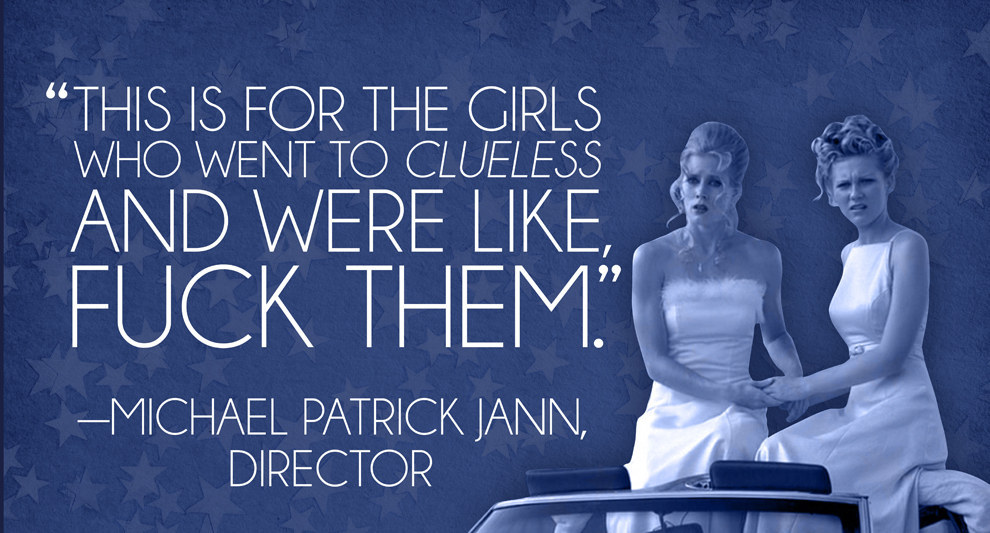
Aside from a few structural changes that Jann made, Drop Dead Gorgeous mostly stuck to Williams' script during filming. There were, of course, some unavoidable tweaks: The film was originally called Dairy Queens until — according to Williams, Jann, and Polone — Dairy Queen sued to have the title changed. Dairy Queen did not respond to a request for comment.
Subplots, like one involving Jann as a pervy janitor spying on the girls, were cut for time, since he was insistent that the film run just under 90 minutes.
The larger battle — which was primarily waged during post-production — was over the film's tone, which was decidedly bleak. Contestant Tammy Curry (Brooke Elise Bushman) dies in a fiery thresher accident, Amber's crush, Brett (Casey Tyler Garven), is shot in the head, and Annette barely survives an explosion after which her badly disfigured hand is fused to a can of beer. And this is all in the first half of the film. While Drop Dead Gorgeous' pitch-black comedy and gleefully over-the-top violence were a selling point for many of the actors who signed on, there were concerns that this darkness would alienate potential audiences.
But that was never something Williams worried about. "I had always seen this as being laser-focused on who it would really appeal to," she said.
But audience reactions had to be taken into account. One of the major changes was a completely redone ending, which Jann explained actually occurred as the result of a test screening.
"In the original ending, Kirstie actually killed herself in prison," he said. "In the next scene, there was just her feet swinging in the jail cell, and it went from her feet swinging down to an ashtray with a still lit cigarette."
With Gladys dead, the shooting spree at the end of the film was the work of librarian Iona Hildebrandt, herself a Mount Rose American Teen Princess during World War II, who snapped as a result of the bastardization of the pageant. The audience had a visceral reaction to the twisted conclusion.
"The first time we showed it, as dark as other parts of the movie are, the whole theater went, 'Ugh,'" Jann continued. "That was too much. That was one step over the line."
Strangely enough, New Line was largely comfortable with the film's darkness. It was only when tracking numbers, which measure cinemagoers' interest in upcoming films, came back that the studio began to get concerned: Few people had heard about Drop Dead Gorgeous, and even fewer wanted to see it.
With no real time left to make the kind of drastic changes they were hoping for, New Line suggested stronger edits. According to Jann, the studio wanted the movie to look more like Clueless, a teen movie from four years earlier that offered a much more lighthearted and ultimately sympathetic take on popular high school girls. It was also a mainstream success, earning $56.6 million domestically.
"It's too late," Jann said. "It's not like that. This is for the girls who went to Clueless and were like, Fuck them."
Jann was frustrated by the sudden notes from the studio, especially since there was so little he could do at that point. That anger was compounded by the fact that what New Line wanted toned down was exactly what had gotten him — and so many others — excited about the project in the first place.
"I just felt burned by the fact that everyone was so positive about it, and then everyone was so negative about it, like the flip of a switch," he said. "When they do market testing, it's like, all of a sudden an idea that everyone loves becomes an idea that everybody's like, 'I don't know…'"
Jann remembers having some discussion over whether Drop Dead Gorgeous would work better if it were marketed as an indie. After all, its off-kilter perspective, deliberately strange storytelling, and sick sense of humor felt more underground than something you'd see in a major studio release.
According to Polone, that never could have happened, because New Line had already sold the international rights early on, which he told BuzzFeed is "not totally uncommon." In an odd bit of studio interference, New Line made at least one request to cater to a foreign market, insisting that filmmakers cast Japanese superstar Seiko Matsuda, a pop singer and songwriter. Matsuda ended up making a brief appearance as the sister of contestant Molly Howard (Tara Redepenning), essentially as a punch line.
While Matsuda's addition to the film had no real bearing on it, the desire to produce Drop Dead Gorgeous as a mainstream film didn't do it any favors. It's tempting to imagine the movie at a smaller studio that might have embraced its darkness rather than, at the very last minute, trying to lighten it into something more sanitized for a wider audience.
"Instead of succeeding at being offbeat," Jann said, "it failed at being mainstream."
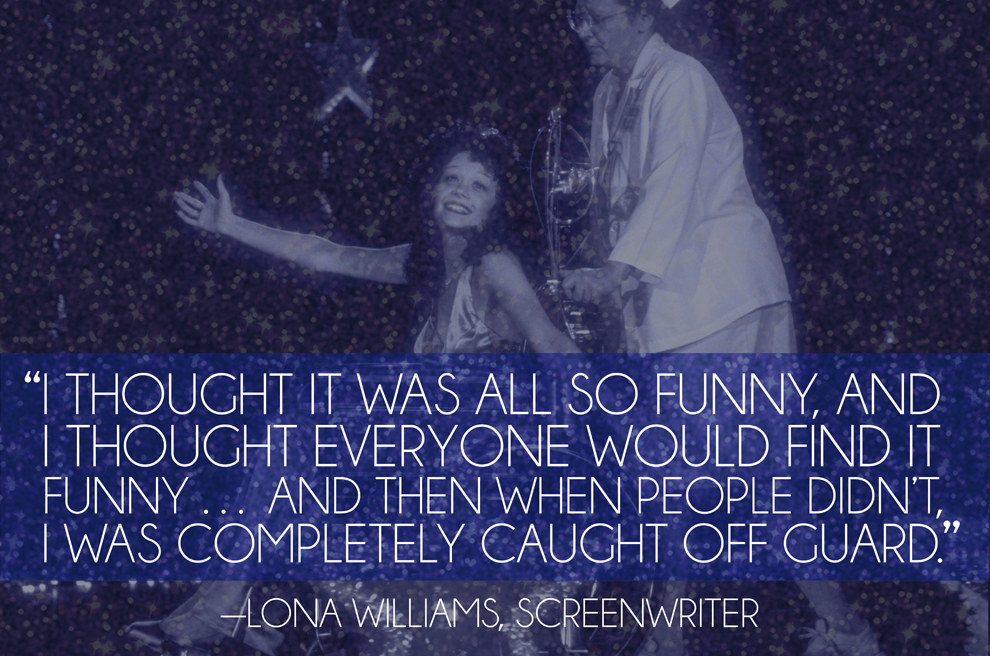
The lack of studio support for Drop Dead Gorgeous ended up hurting its box-office numbers, though Polone insisted that had less to do with New Line's disapproval of the film and more with its attempts to escape production unscathed. In July 1999, the studio had had a few recent successes, including June's Austin Powers: The Spy Who Shagged Me. But Drop Dead Gorgeous was far from being a surefire hit, especially with the disappointing tracking numbers.
Polone suggested that having already sold the international rights, New Line had little interest in investing further.
"You could either spend the money and go forth and try to see if you could make some money," Polone said, "or spend very little money and know that, because of what you've already received from international, because we made the movie on such a small budget, and because of what you know you're going to get from your pay cable deals and home video deals … you can for sure get it out with a single versus a home run and not have to worry about losing money on the movie."
That Drop Dead Gorgeous wasn't a monetary success may have been disappointing, but for Williams and Jann, that was nothing compared to the crushing blows the reviews dealt. Filmmakers of box office bombs can often take comfort in positive reviews: Those who did see their movie actually liked it. Drop Dead Gorgeous, on the other hand, was critically reviled.
"The critics were vicious to our movie," Malloy said. In her review for Entertainment Weekly, Lisa Schwarzbaum wrote, "Satire can withstand a lot of abuse before it wilts into mockery, especially when the subject is something as rich as a teen beauty pageant in heartland America. A cheap cut-glass tiara of a booby prize, then, goes to Drop Dead Gorgeous for messing up so utterly." Roger Ebert was relatively gentle, suggesting in his review that the script probably looked funny on paper.
While the actors were largely able to brush off the negative reviews, Williams was deeply affected by what felt like a personal attack. Drop Dead Gorgeous was her film — and largely based on her own experiences.
"It was completely devastating to me. It really was," Williams said. "It was so hurtful on a deep level, because there was so much of myself in this. Just thinking back to my script, I thought it was all so funny, and I thought everyone would find it funny … and then when people didn't, I was completely caught off-guard."
Until being contacted for this piece, Williams had not seen Drop Dead Gorgeous since its premiere 15 years ago.
"I'm sure some of my view of it is tainted by reactions when it came out," she said. "Because I cared so much. With everything, you care so much about it, and it gets slammed — it's crushing. So what do you do with that? I'm from the Midwest. Repression is good. I'm strong with the repression."
After Drop Dead Gorgeous, Williams' next film was 2001's Sugar & Spice — or, as she had written it, Sugar & Spice & Semi-automatics. Another dark comedy, the film was seriously toned down as a response to the 1999 Columbine massacre and the subsequent cultural shift away from depicting violence among teenagers. The result was so far from her original vision that Williams took her name off the film, an experience that further soured her on Hollywood. Sugar & Spice is now credited to the nonexistent Mandy Nelson.
Jann was similarly jaded by the aftermath of Drop Dead Gorgeous. He never made another feature film. And while he calls his work in commercials "gratifying," he admits that the response to Drop Dead Gorgeous forced him to "take a step back from bigger work."
"It was sort of painful in terms of, I really liked it. I thought it was a good piece of work," Jann said. "It's certainly not perfect or anything like that, but it was really funny and really interesting and not like really anything else, even though there were other fake documentary movies out at that point. It seemed like a new thing. It just felt like, Well, fuck."
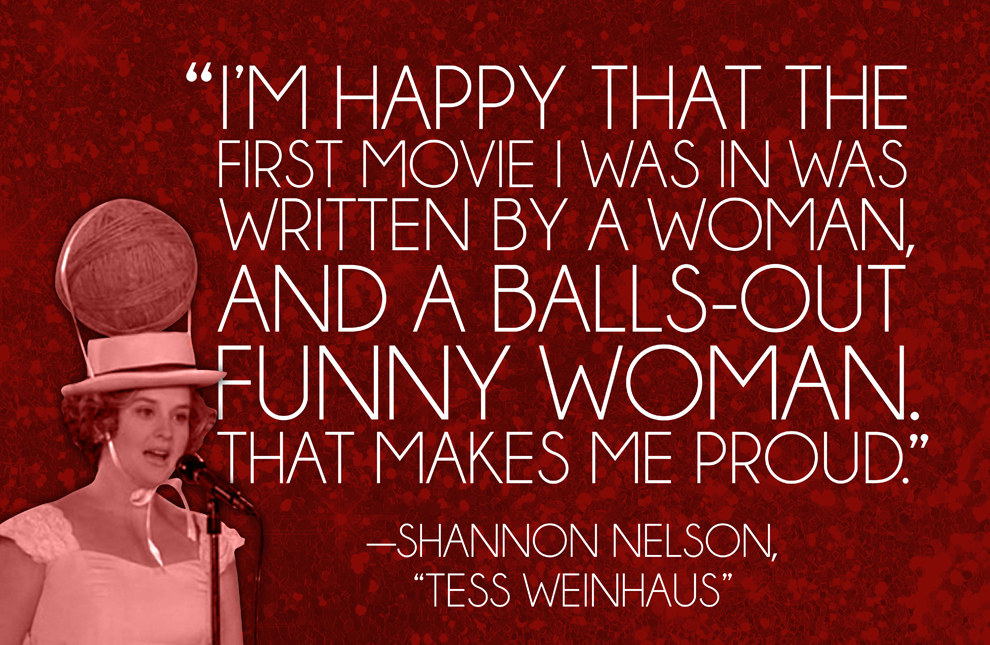
For the actors, life after Drop Dead Gorgeous flopped was decidedly different to what Williams and Jann went through. The biggest success story remains Amy Adams, who approached Malloy at the film's premiere in Los Angeles and said, "Listen, I moved out here, and I'm gonna give it a go." She's now one of the most sought-after actors in Hollywood, currently filming her role as Lois Lane in Batman v Superman: Dawn of Justice, scheduled for release in 2016.
Kirsten Dunst found a much better-received teen movie project in 2000's Bring It On, then broke through to wider stardom with the Spider-Man trilogy, beginning in 2002. And while she didn't have quite as impressive a career trajectory, Denise Richards followed Drop Dead Gorgeous by playing a Bond girl in 1999's The World Is Not Enough.
From their more removed positions, the actors mostly considered Drop Dead Gorgeous an overwhelmingly positive experience. Some read the reviews but weren't fazed by them — "I was on MADtv at the time, so I was used to no one giving a shit about anything," Sasso said — while others didn't even know the film was poorly received.
"I don't think I was aware of that," Janney admitted. "I don't think I knew what the box office was. I didn't think about that. I was excited that I got to be a part of the movie, and it was really fun to do."
When it comes to Drop Dead Gorgeous' enduring cult success, Williams was only vaguely aware of how popular her film has become among a select group of enthusiasts. She has kept in touch with Malloy, who fills her in on some of what she's missed — like every time he's called a "pervert" in a public place.
Jann feels a similar distance to the fandom that has emerged over the past 15 years.
"You run across people who are surprisingly super into it," he said. "To me, it's a long time ago."
Perhaps because they're approached more often — and because they had less of a personal stake in the production — the actors have a clearer sense of the impression Drop Dead Gorgeous has left. None seemed surprised by the film's enduring appeal.
"I think I probably even enjoy it more now in reflection, seeing what it was and the potential that is there," Nelson said. And while she's slightly taken aback when fans recognize her outside of her Tess wardrobe, she fully understands why they love the movie. "It doesn't surprise me that it sticks with people… There's something there. There's something to that."
"It was a great story for me. It was hugely, obviously, important in launching my career," Nelson continued. "And I'm proud that it's my first movie. I really am… Lona had balls. And I'm happy about that. I'm happy that the first movie I was in was written by a woman, and a balls-out funny woman. That makes me proud."
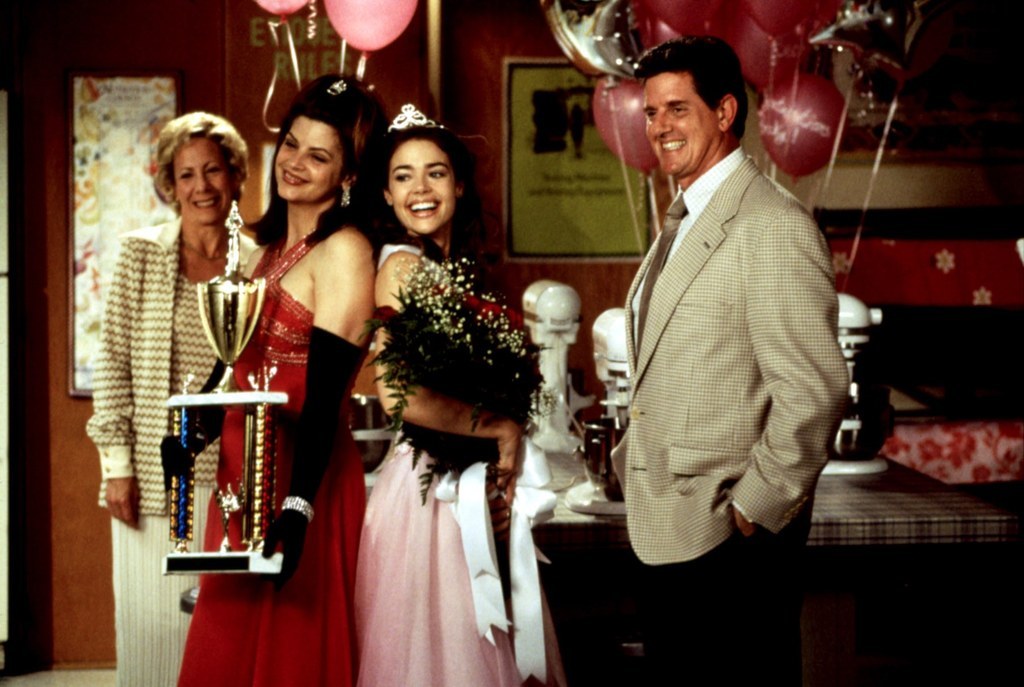
Clearly the concept of success in relation to a cult film is a tricky one. It's true that Drop Dead Gorgeous was a letdown for New Line and many of the people involved in the production. It failed to find an audience in theaters. ("What kind of audience did they want?" Sterling wondered aloud.) But can a film spoken about with such reverence 15 years after its release truly be considered a failure?
Filmmaker Darren Stein has some opinion on the matter. The same year Drop Dead Gorgeous was released, Jawbreaker hit theaters. That film, written and directed by Stein, is an even darker high school satire, complete with a gruesome murder by the eponymous candy. And like Drop Dead Gorgeous, it was lambasted by critics but has become a beloved cult classic in the years following its release.
"I think all cult movies have something that's intrinsically transgressive about them. They go to a place that regular studio films don't go to that's usually darker, edgier, and more forbidden," Stein said. "People collect these films that have these dark elements that they enjoy. It's a truth-telling in a way that you don't see in a lot of films."
Drop Dead Gorgeous and Jawbreaker have the added appeal of skewering high school, which Stein noted is a "dark time for a lot of people." In the tradition of 1988's Heathers, these films satirize a part of life young people wish they could escape and older people wish they could forget. There's also an admittedly unsettling element of wish fulfillment: People love Drop Dead Gorgeous, in part, because the mean girl blows up.
"People have dark fantasies in high school, and as an adult, they can actually live out those fantasies in a cinematic form," Stein continued.
Grannell, who has seen his share of cult movies in and out of his Peaches Christ persona, believes Drop Dead Gorgeous' star power also contributed to its cult status. There's a thrill in seeing established actors like Ellen Barkin and Kirstie Alley go so dark — and look like trash doing so. For all its images of beauty queens made up to look picture perfect, Drop Dead Gorgeous is also ghoulish: Recall the pathetic final performance by the previous year's winner, Mary Johanson (Alexandra Holden), hospitalized for anorexia.
Of course, part of being a cult film is accepting that the movie may not be appreciated in the way it's originally intended. The audience New Line was eager to cultivate was the audience that rejected Drop Dead Gorgeous. Its later success comes from the kind of viewers big studios tend to ignore.
"They thought it was for teenagers everywhere," said Grannell, who likened the thrill young people experience watching Drop Dead Gorgeous to what he and his friends felt watching John Waters films as kids. "And then they realized it was for urban queers."
Urban queers, yes, and also outcasts as a whole — the kind of people who would never dream of participating in a beauty pageant, and those who did but hated every minute of it. Williams and Jann had never intended to make something with broad appeal. Luckily, they didn't.
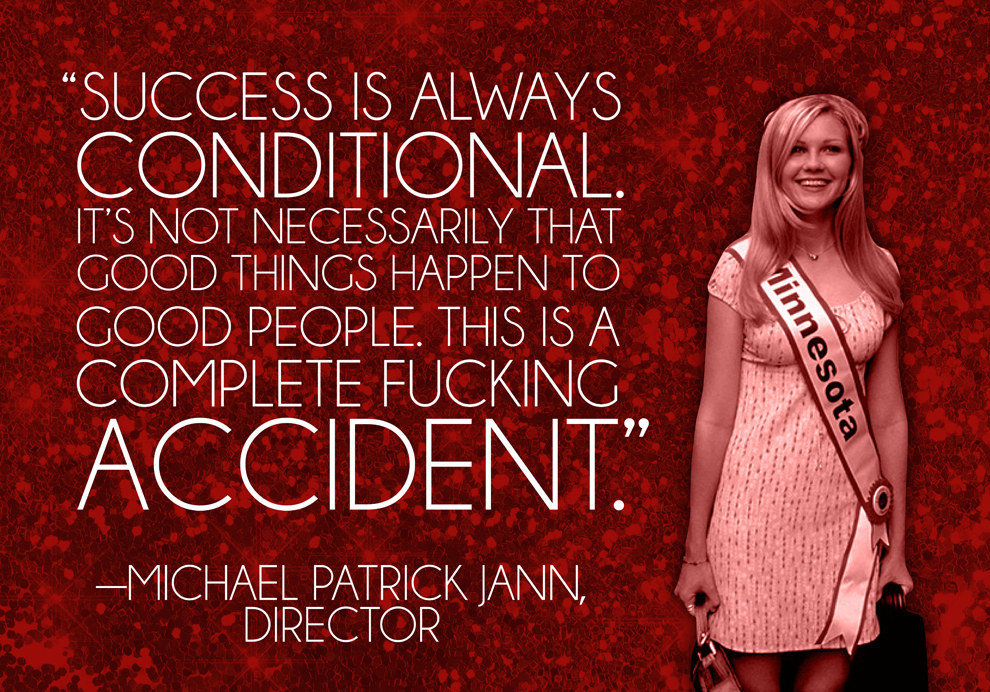
If Drop Dead Gorgeous were a mainstream film, Amber's journey toward success might make some kind of logical sense. But that's not the message this movie is selling.
Although Amber's dream throughout Drop Dead Gorgeous is to be the next Diane Sawyer, a career path she believes starts with becoming the next American Teen Princess, she doesn't make it that far. And yet, the final shot of the film is Amber working as a newscaster — her dream, if not realized, at least closer than ever to being attained.
And it's all happenstance. When Gladys goes on a shooting spree, a stray bullet hits a reporter — and Amber, ever ambitious, picks up the mic and begins reporting from the scene. These final moments are what Jann believes make Drop Dead Gorgeous "a subversive story about success but with a smile."
"It's not bad that she leaps on the corpse of the dead reporter to get what she wants. It's totally random," Jann said. "It's totally mercenary. Success is always conditional. It's not necessarily that good things happen to good people. This is a complete fucking accident."
Even with a cult following behind it, calling Drop Dead Gorgeous a success feels a little shortsighted. But for a film that was always intended for outcasts to have found, at long last, its outcast audience — that's its own kind of accomplishment.
Then there are more tangential achievements inspired by Drop Dead Gorgeous. While producing the film, Polone found himself intrigued by the complicated mother-daughter relationships depicted. He arrived at the idea of a TV series that would explore another mother and daughter who were close in age — though less of a mess than anyone in Drop Dead Gorgeous — and pitched the concept to writer Amy Sherman-Palladino.
"Gilmore Girls wouldn't exist if I had not produced that movie," Polone revealed. However tenuous the correlation, there's a direct link from Drop Dead Gorgeous to a seven-season-long, critically acclaimed television series.
All that aside, Drop Dead Gorgeous remains a strange little film that somehow got made, somehow flopped, and somehow managed to find a legion of fans who can quote the entire thing verbatim.
It's not the traditional Hollywood success story, but for all the disappointments it engendered, Drop Dead Gorgeous achieved its own brand of greatness.
"As a 26-year-old director, I was like, I just want it to be super fucking funny, and I want it to be menacingly subversive, and it's both of those things," Jann said, a rare hint of enthusiasm for Drop Dead Gorgeous creeping into his voice. "Success ordinarily means it met or exceeded your expectations… And I think if you have your little 13-year-old goth girl alive in your heart, and you know that this is the movie for her, then this movie will exceed your expectations."
